人教新目标(Go for it)版九年级全册Unit 1 How can we become good learners?单元复习课件(共48张PPT)
文档属性
| 名称 | 人教新目标(Go for it)版九年级全册Unit 1 How can we become good learners?单元复习课件(共48张PPT) |  | |
| 格式 | pptx | ||
| 文件大小 | 38.7MB | ||
| 资源类型 | 教案 | ||
| 版本资源 | 人教新目标(Go for it)版 | ||
| 科目 | 英语 | ||
| 更新时间 | 2024-08-19 21:13:48 | ||
图片预览

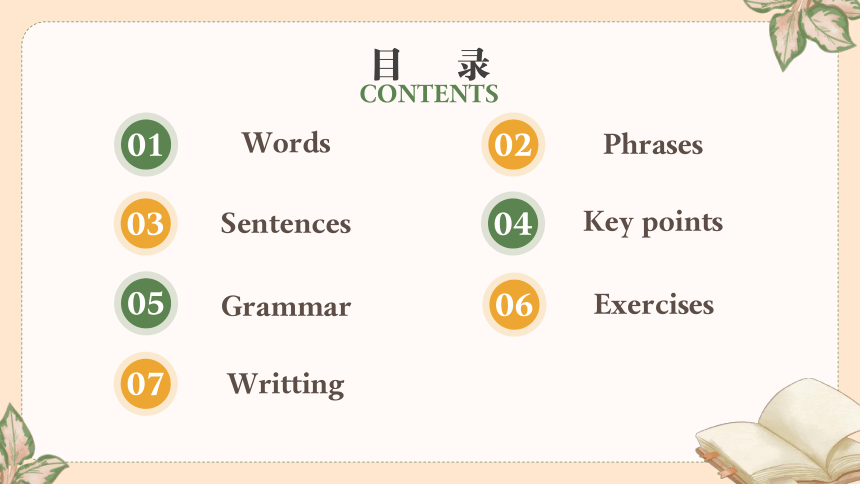

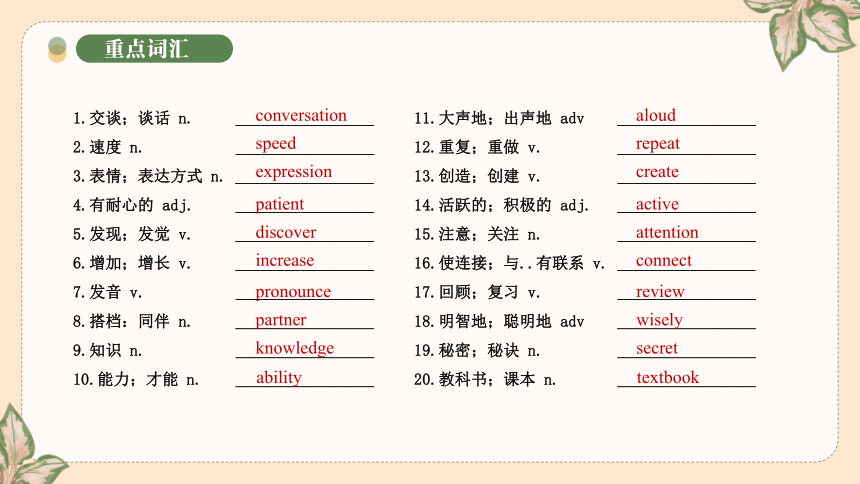
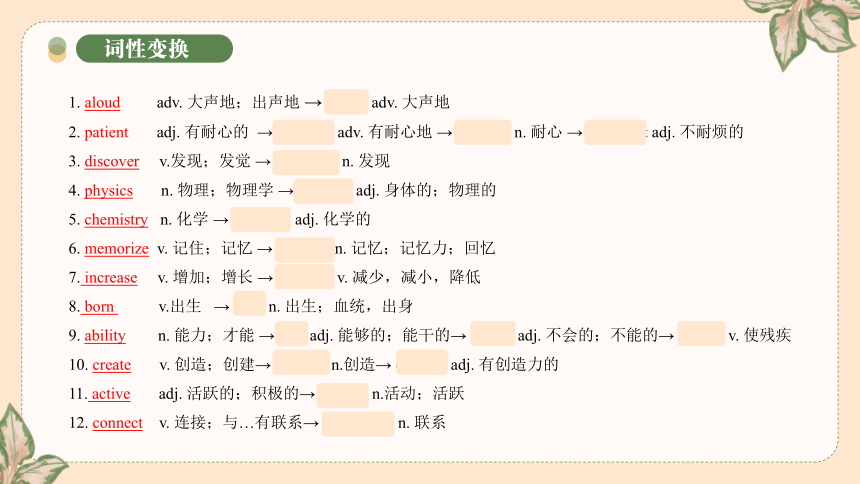


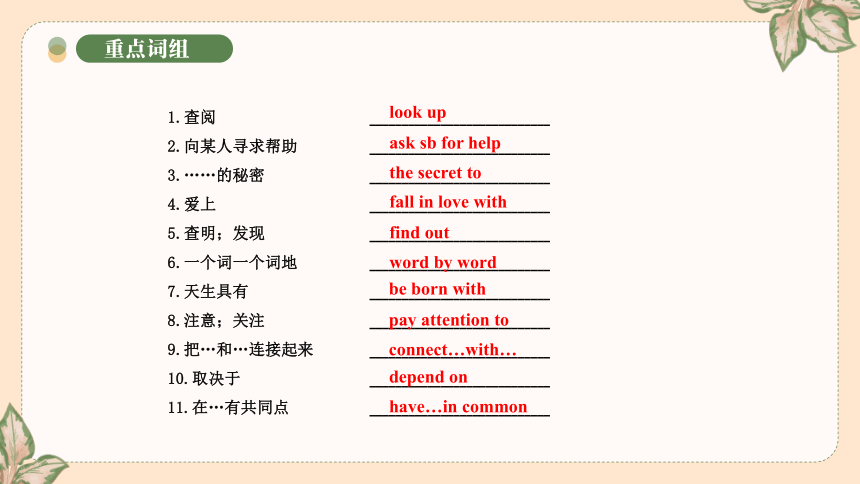
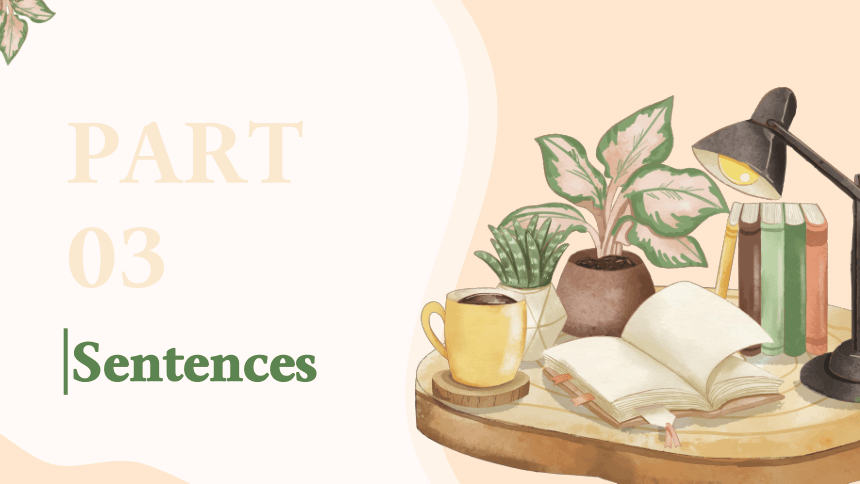
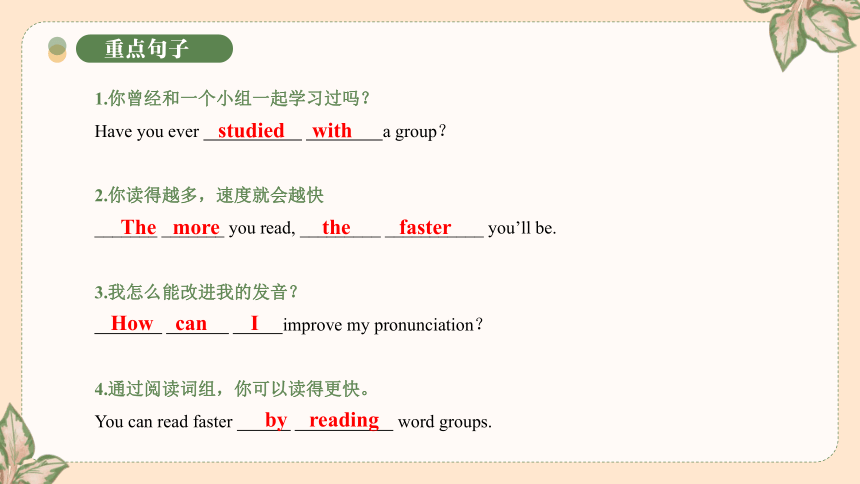
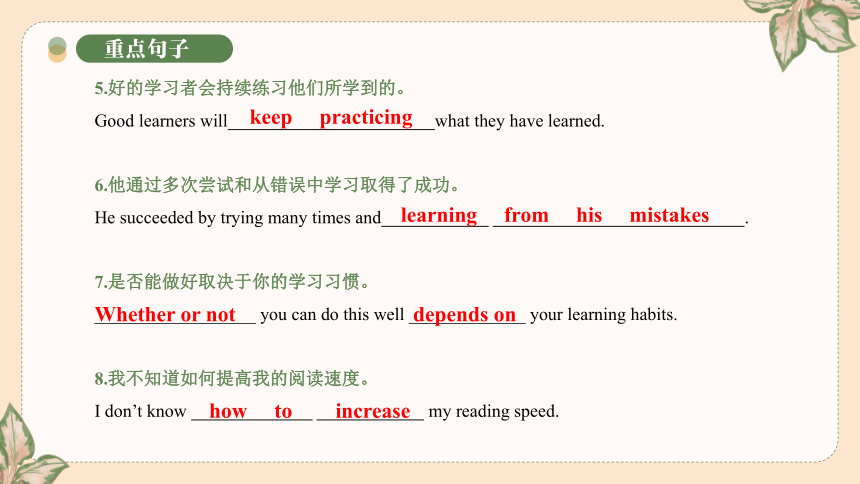

文档简介
(共48张PPT)
Unit One
How can we become good learners
单元复习
目录
CONTENTS
Key points
04
Sentences
03
Words
01
Phrases
02
Exercises
05
Grammar
06
Writting
07
Key words
PART
01
重点词汇
1.交谈;谈话 n. _________________
2.速度 n. _________________
3.表情;表达方式 n. _________________
4.有耐心的 adj. _________________
5.发现;发觉 v. _________________
6.增加;增长 v. _________________
7.发音 v. _________________
8.搭档:同伴 n. _________________
9.知识 n. _________________
10.能力;才能 n. _________________
11.大声地;出声地 adv _________________
12.重复;重做 v. _________________
13.创造;创建 v. _________________
14.活跃的;积极的 adj. _________________
15.注意;关注 n. _________________
16.使连接;与..有联系 v. _________________
17.回顾;复习 v. _________________
18.明智地;聪明地 adv _________________
19.秘密;秘诀 n. _________________
20.教科书;课本 n. _________________
conversation
speed
expression
patient
discover
increase
pronounce
partner
knowledge
ability
aloud
repeat
create
active
attention
connect
review
wisely
secret
textbook
1. aloud adv. 大声地;出声地 → loudly adv. 大声地
2. patient adj. 有耐心的 → patiently adv. 有耐心地 → patience n. 耐心 → impatient adj. 不耐烦的
3. discover v.发现;发觉 → discovery n. 发现
4. physics n. 物理;物理学 → physical adj. 身体的;物理的
5. chemistry n. 化学 → chemical adj. 化学的
6. memorize v. 记住;记忆 → memory n. 记忆;记忆力;回忆
7. increase v. 增加;增长 → decrease v. 减少,减小,降低
8. born v.出生 → birth n. 出生;血统,出身
9. ability n. 能力;才能 → able adj. 能够的;能干的→ unable adj. 不会的;不能的→ disable v. 使残疾
10. create v. 创造;创建→ creation n.创造→ creative adj. 有创造力的
11. active adj. 活跃的;积极的→ activity n.活动;活跃
12. connect v. 连接;与…有联系→ connection n. 联系
词性变换
练一练
1. We need to practice (pronounce) a lot in order to improve our spoken English.
2. There are so many new (sentence) in the text.
3. John enjoys (discover) the beauty in nature by taking photos.
4. After class, we should (review) what we’ve learnt in class.
5.The young man solved the difficult problem . (wise)
6.I believe that you have the (able) to finish the work well.
pronouncing
sentences
discovering
review
wisely
ability
Pharases
PART
02
重点词组
1.查阅
2.向某人寻求帮助
3.……的秘密
4.爱上
5.查明;发现
6.一个词一个词地
7.天生具有
8.注意;关注
9.把…和…连接起来
10.取决于
11.在…有共同点
____________________________
____________________________
____________________________
____________________________
____________________________
____________________________
____________________________
____________________________
____________________________
____________________________
____________________________
look up
ask sb for help
the secret to
fall in love with
find out
word by word
be born with
pay attention to
connect…with…
depend on
have…in common
Sentences
PART
03
重点句子
1.你曾经和一个小组一起学习过吗?
Have you ever a group?
2.你读得越多,速度就会越快
_______ _______ you read, _________ ___________ you’ll be.
3.我怎么能改进我的发音?
improve my pronunciation?
4.通过阅读词组,你可以读得更快。
You can read faster word groups.
studied with
The more the faster
How can I
by reading
重点句子
5.好的学习者会持续练习他们所学到的。
Good learners will what they have learned.
6.他通过多次尝试和从错误中学习取得了成功。
He succeeded by trying many times and .
7.是否能做好取决于你的学习习惯。
__________________ you can do this well _____________ your learning habits.
8.我不知道如何提高我的阅读速度。
I don’t know my reading speed.
keep practicing
learning from his mistakes
Whether or not depends on
how to increase
Key points
PART
04
That doesn’t sound too bad.
【知识点分析】
sound用作连系动词,“听起来”,其后常跟形容词。其他感官系动词包括:
point 1
【练一练】
—________! What a beautiful sound!
—Yes. It ________ a bird.
A. Hears; sounds like B. Listen; sounds C. Listen; sounds like D. Listen to; sounds
英文 sound look smell taste feel
中文 听起来 看起来 闻起来 尝起来 感觉
C
The more you read, the faster you’ll be.
【知识点分析】
“the +比较级,the +比较级”意为“越……就越……”。
point 2
【练一练】
—How can I improve my English
—________ you speak, ________ your English will be.
A. The less; the more B. The more; the better C. The less; the better D. The more; the less
B
Why did Wei Fan find it difficult to learn English
【知识点分析】
find it + adj. to do sth.中的 it 是形式宾语, adj.做宾补, to do sth. 是真正的宾语。
同类的动词还有 think, feel, consider 等。
point 3
【练一练】
(1) I found it _______________ (interest) to talk with my grandfather.
(2) I found it hard for me _______________ (improve) oral English.
interesting
to improve
【知识拓展】
① It‘s +of sb. to do sth.
强调人的性格、品质等;意为“某人做某事是...的”,常用形容词:kind,nice,clever等
② It‘s +for sb. to do sth.
强调客观情况的描述。意为“对某人来说做某事是...的”,常用形容词:easy,hard,difficult,等
point 3
【练一练】
It’s important _____ me to do eye exercises and
it’s really nice _____you to teach me.
for
of
I don’t know how to increase my reading speed.
【知识点分析】
increase by “增长了”,后接百分比或分数。
increase to “增长到”,后接具体数字。
point 4
【练一练】
The population of this town has increase ______ 5 percent.
这个镇的人口增长了5%。
The population of our country has increased _____ 1.3 billion.
我们国家的人口已增长到了13 亿。
by
to
I was afraid to ask questions because my pronunciation was very bad.
【知识点分析】
afraid形容词,意为“害怕,畏惧”,其常见用法如下
point 5
Eg.The boy is afraid of falling into the river. 这个男孩害怕掉进河里。
The girl is afraid to walk alone on the street at night. 这个女孩害怕晚上独自在街上走
It takes time. 这得花时间。
【知识点分析】
It takes sb. some time to do sth. 意思是“花了某人多长时间去做某事”。
it是形式主语,指代后面的动词不定式,动词不定式才是真正的主语。
point 6
【练一练】
It takes time to do the work.
A. too many B. too much C. a few D. quite little
B
Then one day I watched an English movie called Toy Story. I fell in love with this exciting and funny movie!
【知识点分析】
① called Toy Story. called为过去分词短语作后置定语,修饰名词movie.
② 固定短语:fall in love with “爱上某人/某物”
point 7
The teacher spoke so quickly that I did not understand her most of the time.
【知识点分析】
so... that... “如此……以至于”,引导结果状语从句。
point 8
so……that such……that
① so+adj./adv.+that 从句: He ran so fast that he could catch up with his classmates ① such+adj.+可数名词复数/不可数名词+that 从句:
They are such interesting novels that I want to read them once again.
② so+adj.+a(n)+可数名词单数+that 从句: She is so lovely a girl that everyone likes her. ② such+a(an)+adj.+可数名词单数+that 从句:
He is such an active boy that everybody wants him as a teammate.
【注意】如果名词前有 many、much、few、little 等词所修饰时,只能用 so。 【练一练】
(1) He had ___________ (so/such) many falls that he was black and blue all over himself.
(2) He had ___________ (so/such) little education that he was unfit for this job.
so
so
My pronunciation improved as well by listening to the conversations in English movies.
【知识点分析】
also, too,as well, either 这些词均含“也”之意。
point 9
单词 用法
as well 一般不用否定句,通常放在句末,前面无逗号。
either 用于否定句,放在句末,之前加逗号。
too 多用于口语,在肯定句中使用,通常位于句末,之前加逗号。
also also比too正式一些,语气较重,只用于肯定句,一般紧靠动词。
【练一练】
John ________ thinks bears hibernate (冬眠) in winter ________.
A. also; either B. too; as well C. also; as well D. as well; too
C
I discovered that listening to something interesting is the secret to language learning.
【知识点分析】
point 10
【练一练】
Scientists ________ different kinds of ways to treat the illness since 50 years ago.
A. have discovered B. discovered C. will discover D. discover
A
单词 用法
invent “发明”,指创造发明出新的、原来并不存在的东西
Eg.He has invented a new way of making silk. 他发明了一种制造丝绸的新方法。
discover “发现”,指发现或偶然发现原本存在的、但一直未被认识或不为人知的东西。
Eg.Columbus discovered America. 哥伦布发现了美洲。
What about reading aloud to practice pronunciation
【知识点分析】
point 11
【练一练】
Sam is listening to music,but it is too ________.The baby is crying ______ in the bedroom.
At the same time, the telephone is ringing ______.
loud
单词 解析
aloud adv. 大声地;出声地。强调出声,让人听见。
常与shout、cry、read 等连用。
loud adv. 喧闹地;大声地;响亮地
常与talk、speak、laugh 等连用。
loudly adv. 喧闹地;大声地。含有"吵闹"或" 嘈杂"之意。
常与 knock、ring等连用。
aloud
loudly
【知识点分析】
patient的用法:
(1)be patient with ... 对...有耐心
(2)be patient of 能忍受...的
(3)be patient to do sth 耐心做某事
point 12
【练一练】
He was _______ to wait for me for so long. He left alone.
A. so impatient B. patient enough C. too patient D. too impatient
D
they also look for ways to review what they have learned
【知识点分析】
point 13
【练一练】
I _________ my pen everywhere, but I couldn’t _________ it. I wanted to ________ who took it.
A. look for; find out ; find B. found; find out ; look for
C. looked for; found; found out D. looked for; find; find out
D
单词 解析
look for 作“寻找”解时,指寻找的动作和过程。
find 指寻找的结果,即“找到”
find out 指经过观察、调查把某事、某物查出来,搞清楚,弄明白
But whether or not you can do this well depends on your learning habits.
【知识点分析】
① whether or not 意为“是否”, whether引导主语从句,不能与if 替换。谓语动词用第三人称单数。
② depend on 意为“ 取决于;依靠;依赖 ”。后接名词,代词或动名词。既不能用于进行时态也不能用于被动语态。
point 14
【练一练】
1、whether she will come or not ______(be) still a problem.
2、—What can we learn from Robinson Crusoe
—We should depend on ________.
A.us B.our C.ourselves
is
C
……pay attention to it ……Good learners often connect what they need to learn with something they are interested in.
【知识点分析】
pay attention to 后接doing 注意做某事
connect…with… 把……和……联系起来
point 15
【练一练】
1、—Tom, don’t look out of the window. Please ________ what I’m saying.
—Sorry, Mr. Clark.
A.get on with B.look forward to C.pay attention to D.come up with
2、A good teacher can teach students to connect what they learn __________ their real life.
A.with B.for C.in D.on
C
A
you will forget it unless you use it.
【知识点分析】
forget to do sth. “忘记去做某事”, 表示事情未做;
forget doing sth.“忘记做过某事”, 表示事情已做,但是忘记了。
point 16
【练一练】
—Don’t forget ________ your dictionary here to me tomorrow morning.
—Thanks. I won’t.
A.to take B.to bring C.taking D.bringing
B
I discovered that listening to something interesting is the secret to language learning.
【知识点分析】
① 动名词做主语,谓语动词用单数
②形容词修饰不定代词,放在不定代词的后面。
【拓展】不定代词做主语,谓语动词要用第三人称单数。
There is something in my eye.
point 17
Grammar
PART
05
point 1
how引导的特殊疑问句
1、How提问方式,表示“如何,怎样做某事”。
回答:by + doing sth. 表示“通过……方法、手段”等
e.g. —How do you learn English
—I learn by studying with a group.
2、how用来对交通方式提问,意为“如何;怎样”。回答有三种:
①take a(n)/the+交通工具(单数)
②by+交通工具(单数)
③on/in+限定词+交通工具
e.g. —Linda, how do you go to school every day
—I usually go to school ________ bike, but sometimes I go to school ________ foot.
A.with; on B.on; by C.by; on
C
point 1
how引导的特殊疑问句
3、how 用于询问看法,译为“怎样”。
—how do you like china? 你觉得中国怎么样?
—I like it very much. 非常喜欢。
4、how 用于询问身体健康状况,译为“怎么样”。
—how are you? 你好吗?
—I’m fine,thank you. 我很好,谢谢。
5、how 用见面的问候语中。
—How’s it going? 最近怎么样?
—Not bad.
point 2
by的常见用法
1、 by + doing 表示方式,途径:通过….方式
He makes a living by teaching.
2、by+交通工具 表示乘坐交通工具
Do you usually go to school by bus?
3、by+ 时间 表示截止到….; 到….为止
She will be all right by supper time.
4、by +地点 表示位置:在….旁边
They are drawing by the lake.
5、by +动作发出者 表示动作的发出者:由….,被…..
The cake is made by my mother.
point 2
【练一练】
分析下列句子中by的用法。
(1) Come and sit by us.
______________________________________
(2) Peter goes to work by bus every day.
______________________________________
(3) Tony will come back by 10:00 pm.
______________________________________
(4) English is spoken by lots of people.
______________________________________
(5) My brother studies history by working with a group. ______________________________________
by的常见用法
在……旁边
乘坐交通工具
表示时间,在……之前
表示被动
表示方式,通过某种方式
point 2
【拓展】 其他表示方式的介词
1、with + 工具
I wrote the letter with a pen.
2、in + 语言/ 材料/ 颜色/ 衣着/ 声调
She always speaks in a soft voice.
I wrote the letter in ink.
3、through + n
(through 表示通过….方式时,可与by互换,但through后面常接名词)
He succeeded through hard work.
point 2
【练一练】
1、— How about this table ________ the window
— Sorry, this one has been taken by others. You can choose another table.
A.for B.by C.with D.on
2.—________ the way, can you draw 3-D pictures ________ chalk
—Yes. I spend time practising hard.
A.On; by B.By; in C.On; with D.By; with
3. —How do you _______ the word “刺身” _______ Japanese
—It is sashimi.
A.say; in B.speak; with C.tell; in D.talk; with
B
D
A
point 2
【练一练】
4. I practice my listening skills by to English programs on the radio.
A.listens B.listening C.to listen
5. Unluckily, he cut his finger terribly a knife.
A.of B.by C.with
6.— do you practice your pronunciation?
—I read after the tape to practice it.
A.How B.What C.Why
B
C
A
point 3
V-ing的用法
1. v-ing在句中作主语
v-ing作主语时,谓语动词用第三人称单数形式。
Doing morning exercises is good for our health.
2. v-ing在句中作宾语
v-ing在句中作宾语时,一般放在某一及物动词或介词之后充当这一动词或介词的宾语。
(1) 后接v-ing作宾语的及物动词有:finish, enjoy, keep, stand(忍受), suggest, advise, practice, allow, mind 等。
The tourists enjoy staying in Kunming all the year round.
Do you mind opening the window
(2) v-ing作介词的宾语,包括以介词结尾的动词短语,如:give up, take part in,be good at等。
I know you are good at drawing pictures.
Many young people took part in planting trees on Tree Planting Day.
point 3
V-ing的用法
【练一练】
1.________ stamps ________ an interesting hobby.
A.Collect; is B.Collect; are C.Collecting; are D.Collecting; is
2.Have you finished _________ the book yet
A.read B.reading C.to read D.reads
3.Students have had a good habit of ________ hands since COVID-19 broke out in 2019.
A.raising B.washing C.shaking
D
B
B
Exercises
PART
06
练一练
1. The music was _______beautiful _______she lost herself in it.
A.too; to B.such; that
C.so; that D.enough; to
2. The more sports you do, _______you will be.
A.the healthy B.the healthier
C.the more healthier D.the much healthy
3. The students raise money for their school trip _______newspapers.
A.selling B.on selling C.by selling D.to sell
4. He just accepted what she told him.He never thought to _______it.
A.ask B.tell C.question D.say
5._______ you don’t like him, try to talk to him first.
A.If B.Even if C.Because D.Since
C
B
C
C
B
练一练
6.—_______ going out for dinner tonight?
—Sounds good.
A.Why not B.Why don’t you C.How about D.Shall we
7.—_______ you ever _______with a group?
—Yes.It helps a lot.
A.Do; studies B.Have; study C.Do; studied D.Have; studied
8.It’s _______cold _______go swimming in winter in Beijing.
A.too; to B.so; that C.such; that D.enough; to
9.—How do you practice _______English?
—By _______word cards.
A.speaking; reading B.speak; read C.speaking; read D.speak; reading
10.We found _______hard to finish the work in such a short time.
A.that B.its C.it D.this
C
D
A
A
C
Writting
PART
07
Writting
How can we become good learners
本单元可能涉及的作文话题如下:
1、写信形式:
你的朋友在学习英语时遇到一些困难,请根据表格内容给他回信,就学习方法给他提出建议。
2、征文形式:
在丰富多彩的初中学习生活中,你一定积累了很多学习方法和经验吧!现校刊英文专栏以 “Learning to learn”为主题征稿。
3、看图写作:
阅读是英语学习的重要途径。请你结合下面图示信息,以“How reading improves my English”为题写一篇文章。
范 文
为了交流学习经验,提高学习效率,某英语报社正在举办以"How to learn English well " 为题的征文比赛。请你根据下图提示,写一篇英语征文稿。
范 文
How to Learn English Well?
Many of my classmates have difficulty in learning English.Some of them are not good at spoken English and others don’t do well in English listening.
Here are some ways on how to improve their English.Firstly, they can read aloud in the morning with their partner to practice their spoken English.In this way, they will make great progress.Besides, listening to tapes every day is helpful because practice makes perfect.
In a word, it is necessary to learn English hard.I believe they will get good grades in English in the end.
遇到的困难:
1、口语差
2、听力不好
提高英语水平的建议:
1、大声朗读英语
2、听磁带
鼓励:
1、学习英语的重要性
2、鼓励话语
Homework
Unit One
How can we become good learners
单元复习
目录
CONTENTS
Key points
04
Sentences
03
Words
01
Phrases
02
Exercises
05
Grammar
06
Writting
07
Key words
PART
01
重点词汇
1.交谈;谈话 n. _________________
2.速度 n. _________________
3.表情;表达方式 n. _________________
4.有耐心的 adj. _________________
5.发现;发觉 v. _________________
6.增加;增长 v. _________________
7.发音 v. _________________
8.搭档:同伴 n. _________________
9.知识 n. _________________
10.能力;才能 n. _________________
11.大声地;出声地 adv _________________
12.重复;重做 v. _________________
13.创造;创建 v. _________________
14.活跃的;积极的 adj. _________________
15.注意;关注 n. _________________
16.使连接;与..有联系 v. _________________
17.回顾;复习 v. _________________
18.明智地;聪明地 adv _________________
19.秘密;秘诀 n. _________________
20.教科书;课本 n. _________________
conversation
speed
expression
patient
discover
increase
pronounce
partner
knowledge
ability
aloud
repeat
create
active
attention
connect
review
wisely
secret
textbook
1. aloud adv. 大声地;出声地 → loudly adv. 大声地
2. patient adj. 有耐心的 → patiently adv. 有耐心地 → patience n. 耐心 → impatient adj. 不耐烦的
3. discover v.发现;发觉 → discovery n. 发现
4. physics n. 物理;物理学 → physical adj. 身体的;物理的
5. chemistry n. 化学 → chemical adj. 化学的
6. memorize v. 记住;记忆 → memory n. 记忆;记忆力;回忆
7. increase v. 增加;增长 → decrease v. 减少,减小,降低
8. born v.出生 → birth n. 出生;血统,出身
9. ability n. 能力;才能 → able adj. 能够的;能干的→ unable adj. 不会的;不能的→ disable v. 使残疾
10. create v. 创造;创建→ creation n.创造→ creative adj. 有创造力的
11. active adj. 活跃的;积极的→ activity n.活动;活跃
12. connect v. 连接;与…有联系→ connection n. 联系
词性变换
练一练
1. We need to practice (pronounce) a lot in order to improve our spoken English.
2. There are so many new (sentence) in the text.
3. John enjoys (discover) the beauty in nature by taking photos.
4. After class, we should (review) what we’ve learnt in class.
5.The young man solved the difficult problem . (wise)
6.I believe that you have the (able) to finish the work well.
pronouncing
sentences
discovering
review
wisely
ability
Pharases
PART
02
重点词组
1.查阅
2.向某人寻求帮助
3.……的秘密
4.爱上
5.查明;发现
6.一个词一个词地
7.天生具有
8.注意;关注
9.把…和…连接起来
10.取决于
11.在…有共同点
____________________________
____________________________
____________________________
____________________________
____________________________
____________________________
____________________________
____________________________
____________________________
____________________________
____________________________
look up
ask sb for help
the secret to
fall in love with
find out
word by word
be born with
pay attention to
connect…with…
depend on
have…in common
Sentences
PART
03
重点句子
1.你曾经和一个小组一起学习过吗?
Have you ever a group?
2.你读得越多,速度就会越快
_______ _______ you read, _________ ___________ you’ll be.
3.我怎么能改进我的发音?
improve my pronunciation?
4.通过阅读词组,你可以读得更快。
You can read faster word groups.
studied with
The more the faster
How can I
by reading
重点句子
5.好的学习者会持续练习他们所学到的。
Good learners will what they have learned.
6.他通过多次尝试和从错误中学习取得了成功。
He succeeded by trying many times and .
7.是否能做好取决于你的学习习惯。
__________________ you can do this well _____________ your learning habits.
8.我不知道如何提高我的阅读速度。
I don’t know my reading speed.
keep practicing
learning from his mistakes
Whether or not depends on
how to increase
Key points
PART
04
That doesn’t sound too bad.
【知识点分析】
sound用作连系动词,“听起来”,其后常跟形容词。其他感官系动词包括:
point 1
【练一练】
—________! What a beautiful sound!
—Yes. It ________ a bird.
A. Hears; sounds like B. Listen; sounds C. Listen; sounds like D. Listen to; sounds
英文 sound look smell taste feel
中文 听起来 看起来 闻起来 尝起来 感觉
C
The more you read, the faster you’ll be.
【知识点分析】
“the +比较级,the +比较级”意为“越……就越……”。
point 2
【练一练】
—How can I improve my English
—________ you speak, ________ your English will be.
A. The less; the more B. The more; the better C. The less; the better D. The more; the less
B
Why did Wei Fan find it difficult to learn English
【知识点分析】
find it + adj. to do sth.中的 it 是形式宾语, adj.做宾补, to do sth. 是真正的宾语。
同类的动词还有 think, feel, consider 等。
point 3
【练一练】
(1) I found it _______________ (interest) to talk with my grandfather.
(2) I found it hard for me _______________ (improve) oral English.
interesting
to improve
【知识拓展】
① It‘s +of sb. to do sth.
强调人的性格、品质等;意为“某人做某事是...的”,常用形容词:kind,nice,clever等
② It‘s +for sb. to do sth.
强调客观情况的描述。意为“对某人来说做某事是...的”,常用形容词:easy,hard,difficult,等
point 3
【练一练】
It’s important _____ me to do eye exercises and
it’s really nice _____you to teach me.
for
of
I don’t know how to increase my reading speed.
【知识点分析】
increase by “增长了”,后接百分比或分数。
increase to “增长到”,后接具体数字。
point 4
【练一练】
The population of this town has increase ______ 5 percent.
这个镇的人口增长了5%。
The population of our country has increased _____ 1.3 billion.
我们国家的人口已增长到了13 亿。
by
to
I was afraid to ask questions because my pronunciation was very bad.
【知识点分析】
afraid形容词,意为“害怕,畏惧”,其常见用法如下
point 5
Eg.The boy is afraid of falling into the river. 这个男孩害怕掉进河里。
The girl is afraid to walk alone on the street at night. 这个女孩害怕晚上独自在街上走
It takes time. 这得花时间。
【知识点分析】
It takes sb. some time to do sth. 意思是“花了某人多长时间去做某事”。
it是形式主语,指代后面的动词不定式,动词不定式才是真正的主语。
point 6
【练一练】
It takes time to do the work.
A. too many B. too much C. a few D. quite little
B
Then one day I watched an English movie called Toy Story. I fell in love with this exciting and funny movie!
【知识点分析】
① called Toy Story. called为过去分词短语作后置定语,修饰名词movie.
② 固定短语:fall in love with “爱上某人/某物”
point 7
The teacher spoke so quickly that I did not understand her most of the time.
【知识点分析】
so... that... “如此……以至于”,引导结果状语从句。
point 8
so……that such……that
① so+adj./adv.+that 从句: He ran so fast that he could catch up with his classmates ① such+adj.+可数名词复数/不可数名词+that 从句:
They are such interesting novels that I want to read them once again.
② so+adj.+a(n)+可数名词单数+that 从句: She is so lovely a girl that everyone likes her. ② such+a(an)+adj.+可数名词单数+that 从句:
He is such an active boy that everybody wants him as a teammate.
【注意】如果名词前有 many、much、few、little 等词所修饰时,只能用 so。 【练一练】
(1) He had ___________ (so/such) many falls that he was black and blue all over himself.
(2) He had ___________ (so/such) little education that he was unfit for this job.
so
so
My pronunciation improved as well by listening to the conversations in English movies.
【知识点分析】
also, too,as well, either 这些词均含“也”之意。
point 9
单词 用法
as well 一般不用否定句,通常放在句末,前面无逗号。
either 用于否定句,放在句末,之前加逗号。
too 多用于口语,在肯定句中使用,通常位于句末,之前加逗号。
also also比too正式一些,语气较重,只用于肯定句,一般紧靠动词。
【练一练】
John ________ thinks bears hibernate (冬眠) in winter ________.
A. also; either B. too; as well C. also; as well D. as well; too
C
I discovered that listening to something interesting is the secret to language learning.
【知识点分析】
point 10
【练一练】
Scientists ________ different kinds of ways to treat the illness since 50 years ago.
A. have discovered B. discovered C. will discover D. discover
A
单词 用法
invent “发明”,指创造发明出新的、原来并不存在的东西
Eg.He has invented a new way of making silk. 他发明了一种制造丝绸的新方法。
discover “发现”,指发现或偶然发现原本存在的、但一直未被认识或不为人知的东西。
Eg.Columbus discovered America. 哥伦布发现了美洲。
What about reading aloud to practice pronunciation
【知识点分析】
point 11
【练一练】
Sam is listening to music,but it is too ________.The baby is crying ______ in the bedroom.
At the same time, the telephone is ringing ______.
loud
单词 解析
aloud adv. 大声地;出声地。强调出声,让人听见。
常与shout、cry、read 等连用。
loud adv. 喧闹地;大声地;响亮地
常与talk、speak、laugh 等连用。
loudly adv. 喧闹地;大声地。含有"吵闹"或" 嘈杂"之意。
常与 knock、ring等连用。
aloud
loudly
【知识点分析】
patient的用法:
(1)be patient with ... 对...有耐心
(2)be patient of 能忍受...的
(3)be patient to do sth 耐心做某事
point 12
【练一练】
He was _______ to wait for me for so long. He left alone.
A. so impatient B. patient enough C. too patient D. too impatient
D
they also look for ways to review what they have learned
【知识点分析】
point 13
【练一练】
I _________ my pen everywhere, but I couldn’t _________ it. I wanted to ________ who took it.
A. look for; find out ; find B. found; find out ; look for
C. looked for; found; found out D. looked for; find; find out
D
单词 解析
look for 作“寻找”解时,指寻找的动作和过程。
find 指寻找的结果,即“找到”
find out 指经过观察、调查把某事、某物查出来,搞清楚,弄明白
But whether or not you can do this well depends on your learning habits.
【知识点分析】
① whether or not 意为“是否”, whether引导主语从句,不能与if 替换。谓语动词用第三人称单数。
② depend on 意为“ 取决于;依靠;依赖 ”。后接名词,代词或动名词。既不能用于进行时态也不能用于被动语态。
point 14
【练一练】
1、whether she will come or not ______(be) still a problem.
2、—What can we learn from Robinson Crusoe
—We should depend on ________.
A.us B.our C.ourselves
is
C
……pay attention to it ……Good learners often connect what they need to learn with something they are interested in.
【知识点分析】
pay attention to 后接doing 注意做某事
connect…with… 把……和……联系起来
point 15
【练一练】
1、—Tom, don’t look out of the window. Please ________ what I’m saying.
—Sorry, Mr. Clark.
A.get on with B.look forward to C.pay attention to D.come up with
2、A good teacher can teach students to connect what they learn __________ their real life.
A.with B.for C.in D.on
C
A
you will forget it unless you use it.
【知识点分析】
forget to do sth. “忘记去做某事”, 表示事情未做;
forget doing sth.“忘记做过某事”, 表示事情已做,但是忘记了。
point 16
【练一练】
—Don’t forget ________ your dictionary here to me tomorrow morning.
—Thanks. I won’t.
A.to take B.to bring C.taking D.bringing
B
I discovered that listening to something interesting is the secret to language learning.
【知识点分析】
① 动名词做主语,谓语动词用单数
②形容词修饰不定代词,放在不定代词的后面。
【拓展】不定代词做主语,谓语动词要用第三人称单数。
There is something in my eye.
point 17
Grammar
PART
05
point 1
how引导的特殊疑问句
1、How提问方式,表示“如何,怎样做某事”。
回答:by + doing sth. 表示“通过……方法、手段”等
e.g. —How do you learn English
—I learn by studying with a group.
2、how用来对交通方式提问,意为“如何;怎样”。回答有三种:
①take a(n)/the+交通工具(单数)
②by+交通工具(单数)
③on/in+限定词+交通工具
e.g. —Linda, how do you go to school every day
—I usually go to school ________ bike, but sometimes I go to school ________ foot.
A.with; on B.on; by C.by; on
C
point 1
how引导的特殊疑问句
3、how 用于询问看法,译为“怎样”。
—how do you like china? 你觉得中国怎么样?
—I like it very much. 非常喜欢。
4、how 用于询问身体健康状况,译为“怎么样”。
—how are you? 你好吗?
—I’m fine,thank you. 我很好,谢谢。
5、how 用见面的问候语中。
—How’s it going? 最近怎么样?
—Not bad.
point 2
by的常见用法
1、 by + doing 表示方式,途径:通过….方式
He makes a living by teaching.
2、by+交通工具 表示乘坐交通工具
Do you usually go to school by bus?
3、by+ 时间 表示截止到….; 到….为止
She will be all right by supper time.
4、by +地点 表示位置:在….旁边
They are drawing by the lake.
5、by +动作发出者 表示动作的发出者:由….,被…..
The cake is made by my mother.
point 2
【练一练】
分析下列句子中by的用法。
(1) Come and sit by us.
______________________________________
(2) Peter goes to work by bus every day.
______________________________________
(3) Tony will come back by 10:00 pm.
______________________________________
(4) English is spoken by lots of people.
______________________________________
(5) My brother studies history by working with a group. ______________________________________
by的常见用法
在……旁边
乘坐交通工具
表示时间,在……之前
表示被动
表示方式,通过某种方式
point 2
【拓展】 其他表示方式的介词
1、with + 工具
I wrote the letter with a pen.
2、in + 语言/ 材料/ 颜色/ 衣着/ 声调
She always speaks in a soft voice.
I wrote the letter in ink.
3、through + n
(through 表示通过….方式时,可与by互换,但through后面常接名词)
He succeeded through hard work.
point 2
【练一练】
1、— How about this table ________ the window
— Sorry, this one has been taken by others. You can choose another table.
A.for B.by C.with D.on
2.—________ the way, can you draw 3-D pictures ________ chalk
—Yes. I spend time practising hard.
A.On; by B.By; in C.On; with D.By; with
3. —How do you _______ the word “刺身” _______ Japanese
—It is sashimi.
A.say; in B.speak; with C.tell; in D.talk; with
B
D
A
point 2
【练一练】
4. I practice my listening skills by to English programs on the radio.
A.listens B.listening C.to listen
5. Unluckily, he cut his finger terribly a knife.
A.of B.by C.with
6.— do you practice your pronunciation?
—I read after the tape to practice it.
A.How B.What C.Why
B
C
A
point 3
V-ing的用法
1. v-ing在句中作主语
v-ing作主语时,谓语动词用第三人称单数形式。
Doing morning exercises is good for our health.
2. v-ing在句中作宾语
v-ing在句中作宾语时,一般放在某一及物动词或介词之后充当这一动词或介词的宾语。
(1) 后接v-ing作宾语的及物动词有:finish, enjoy, keep, stand(忍受), suggest, advise, practice, allow, mind 等。
The tourists enjoy staying in Kunming all the year round.
Do you mind opening the window
(2) v-ing作介词的宾语,包括以介词结尾的动词短语,如:give up, take part in,be good at等。
I know you are good at drawing pictures.
Many young people took part in planting trees on Tree Planting Day.
point 3
V-ing的用法
【练一练】
1.________ stamps ________ an interesting hobby.
A.Collect; is B.Collect; are C.Collecting; are D.Collecting; is
2.Have you finished _________ the book yet
A.read B.reading C.to read D.reads
3.Students have had a good habit of ________ hands since COVID-19 broke out in 2019.
A.raising B.washing C.shaking
D
B
B
Exercises
PART
06
练一练
1. The music was _______beautiful _______she lost herself in it.
A.too; to B.such; that
C.so; that D.enough; to
2. The more sports you do, _______you will be.
A.the healthy B.the healthier
C.the more healthier D.the much healthy
3. The students raise money for their school trip _______newspapers.
A.selling B.on selling C.by selling D.to sell
4. He just accepted what she told him.He never thought to _______it.
A.ask B.tell C.question D.say
5._______ you don’t like him, try to talk to him first.
A.If B.Even if C.Because D.Since
C
B
C
C
B
练一练
6.—_______ going out for dinner tonight?
—Sounds good.
A.Why not B.Why don’t you C.How about D.Shall we
7.—_______ you ever _______with a group?
—Yes.It helps a lot.
A.Do; studies B.Have; study C.Do; studied D.Have; studied
8.It’s _______cold _______go swimming in winter in Beijing.
A.too; to B.so; that C.such; that D.enough; to
9.—How do you practice _______English?
—By _______word cards.
A.speaking; reading B.speak; read C.speaking; read D.speak; reading
10.We found _______hard to finish the work in such a short time.
A.that B.its C.it D.this
C
D
A
A
C
Writting
PART
07
Writting
How can we become good learners
本单元可能涉及的作文话题如下:
1、写信形式:
你的朋友在学习英语时遇到一些困难,请根据表格内容给他回信,就学习方法给他提出建议。
2、征文形式:
在丰富多彩的初中学习生活中,你一定积累了很多学习方法和经验吧!现校刊英文专栏以 “Learning to learn”为主题征稿。
3、看图写作:
阅读是英语学习的重要途径。请你结合下面图示信息,以“How reading improves my English”为题写一篇文章。
范 文
为了交流学习经验,提高学习效率,某英语报社正在举办以"How to learn English well " 为题的征文比赛。请你根据下图提示,写一篇英语征文稿。
范 文
How to Learn English Well?
Many of my classmates have difficulty in learning English.Some of them are not good at spoken English and others don’t do well in English listening.
Here are some ways on how to improve their English.Firstly, they can read aloud in the morning with their partner to practice their spoken English.In this way, they will make great progress.Besides, listening to tapes every day is helpful because practice makes perfect.
In a word, it is necessary to learn English hard.I believe they will get good grades in English in the end.
遇到的困难:
1、口语差
2、听力不好
提高英语水平的建议:
1、大声朗读英语
2、听磁带
鼓励:
1、学习英语的重要性
2、鼓励话语
Homework
同课章节目录
- Unit 1 How can we become good learners.
- Section A
- Section B
- Unit 2 I think that mooncakes are delicious!
- Section A
- Section B
- Unit 3 Could you please tell me where the restroom
- Section A
- Section B
- Unit 4 I used to be afraid of the dark.
- Section A
- Section B
- Unit 5 What are the shirts made of?
- Section A
- Section B
- Review of Units 1-5
- Unit 6 When was it invented?
- Section A
- Section B
- Unit 7 Teenagers should be allowed to choose their
- Section A
- Section B
- Unit 8 It must belong to Carla.
- Section A
- Section B
- Unit 9 I like music that I can dance to.
- Section A
- Section B
- Unit 10 You're supposed to shake hands.
- Section A
- Section B
- Review of Units 6-10
- Unit 11 Sad movies make me cry.
- Section A
- Section B
- Unit 12 Life is full of the unexpected
- Section A
- Section B
- Unit 13 We're trying to save the earth!
- Section A
- Section B
- Unit 14 I remember meeting all of you in Grade 7.
- Section A
- Section B
- Review of Units 11-14
